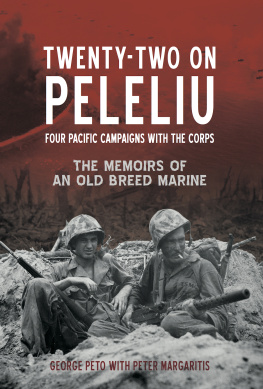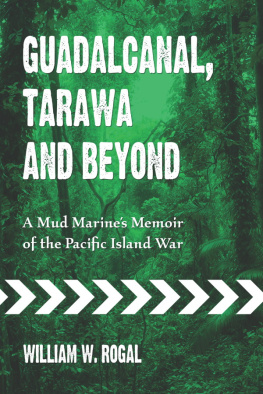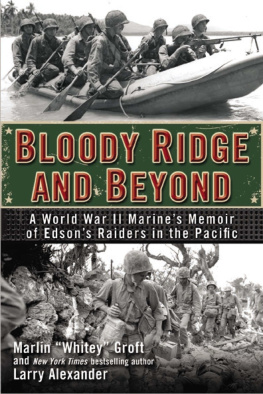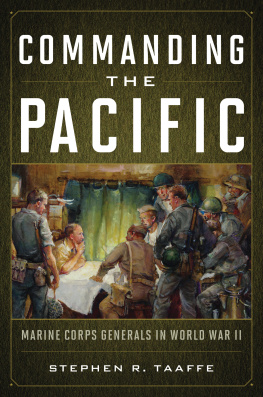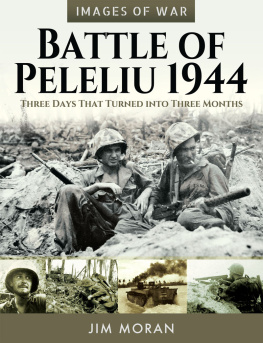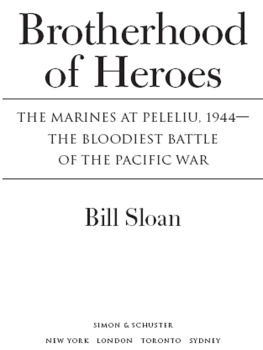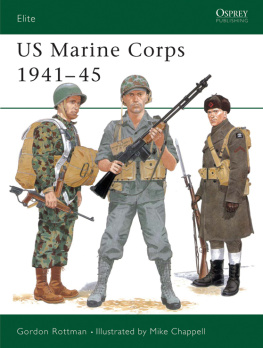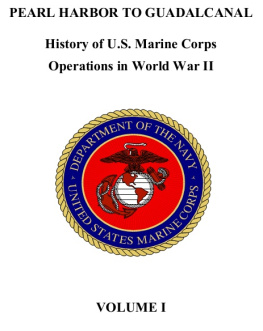
Contents
A Note from the Co-author
In the late spring of 2015, I decided to enter a U.S. Naval Institute 3,000-word-essay contest. The subject was to be any noteworthy U.S. Marine Corps event that had significantly changed American history. This would be a challenge for me, because for over 30 years, although my research specialty has been World War II, I had mainly studied and written about the European Theater. So I was getting into somewhat unfamiliar ground.
I talked to a couple of American Legion cohorts that were Marine veterans, and their consensus was that I do the essay contest about the controversial invasion of Peleliu in September, 1944. A navy buddy of mine suggested that I should consult with an old World War II Marine veteran who lived here in Central Ohio, a fellow named George Peto. He was one of what they called the Old Breed and had actually been on the Peleliu operation.
I first met with George on June 24, 2015 in a Bob Evans restaurant, not too far from his home on the north side of Columbus. George and I quickly struck up a friendship, and I invited him to co-write the essay with me. We thought that we would make a good team, since I was an experienced writer and researcher, and George had not only actually been there in the thick of it, but had a remarkable memory about his experiences. And as everyone who met him knows, he enjoyed retelling them.
Our essay unfortunately did not win the contest, so George and I decided to expand our work and turn what we had written into a book. As we continued our research though, and as he told me more about his past, I listened, fascinated, marveling at his consistent, detailed memory of remarkable things that had happened to him many decades ago. I finally realized that a much better book to write would be about his life. I wanted toI had to write about him, to preserve his memories for everyone, especially his daughter Nancy, his son George Lee, and his friends. He good-naturedly agreed, and so we were off.
One thing I found amazing was that despite the fact that he was 92 years old when I began interviewing him, Georges stories did not vary much from one telling to the next (except perhaps for some added detail), and sometimes certain phrases were almost word for word. Another reassuring item was that his accounts on certain events were nearly always backed up by subsequent research on my part.
This book is the result. It includes Georges exploits as a young boy, growing up in a very interesting, long-past period in American history. It follows him in his early career in the Marines, his intensive Pacific campaigns, and his interesting life after the war. I definitely have never met a man who has had as exciting a life as his. And I learned so much from him and our research about war in the Pacific.
There are points in the narrative where I have slightly dramatized his memories to give them more depth and to help give his story continuity. They are, however, all backed up by extensive research. And the stories are all absolutely true, written as he told them.
I would like to thank a couple people for helping us in our endeavor. To Steve Ebersole for his encouragement, and for putting me in touch with this amazing Marine. My heartfelt appreciation to son George Lee Peto, for encouraging his father to undertake this project, and to daughter Nancy Peto for her wonderful support. Last, my deep gratitude to my loving wife Mindy, who put up with my weird, idiosyncratic behavior during this time.

Peter Margaritis
Introduction
My name is George Peto. I am a World War II veteran. I have been a Marine for over seven decades, what fellow Marines would refer to as one of The Old Breed. That means I am one of those ancient guys that joined the Marine Corps as a regular (not a reserve) before the outbreak of World War II. I guess that there are not many of us left today. I read one estimate that stated World War II veterans are dying at the rate of almost 500 a day. Wow.
According to statistics, of the 670,000 Marines that served in the war, there are probably only 22,000 still alive today. Of them, only about a thousand are Old Breed, like meabout a sixth of one percent. Nearly all the guys who served and fought with me are now deceased. So I guess that makes me a part of a very small group indeed.
Sometimes I look back at my time in the Corps and just shake my head in wonder. I served through 32 months of war in the Pacific, and I was never even wounded. Heavens knows, I came pretty damn close to it dozens of times, but somehow I survived, although I did get pounded a few times, and dog sick a few more. According to the numbers, by rights, I should have actually died many times: maybe at Cape Gloucester by a sniper; certainly at Peleliu a dozen times, from all the intensive incoming fire we took; or Okinawa in the many advances that we made across the island. Yet still, somehow I made it through the war.
You know, I find it strangely ironic that thousands of my fellow veterans were wounded in the war, came back and were decorated for valor, many (although not nearly enough) were fawned over by the VA (back when the VA was doing its job right), discharged with pomp and circumstance, and as rightfully considered heroes, have been recognized and honored for decades. Me, I served throughout the entire war, fought in four major Pacific campaigns, saw, experienced, and endured horrible things no human being should ever have to go through, and in the end, I was unceremoniously sent back to Great Lakes Naval Training Center, processed out, given a quick handshake, and told thanks a lot. I was given some battle ribbons and years later, because of the malaria I contracted during the war, eligibility for VA benefits.
Nothing else.
Well, not for several years. Slowly over time though, I have been lucky enough to receive many honors. A couple decades ago I began to tell schoolchildren in Central Ohio about my experiences, giving them an awareness of what my generation did to ensure the rights and freedoms that we enjoy. I feel good about that.
In the many decades since the war, I have had been fortunate to continue living an interesting life. I had a long career managing my own store, and was happily married for 65 years. Ive been told that I can still be obstinate at times.
Maybe that is what has allowed me to stay on. Even now at the ripe old age of 93, I am lucky enough to continue to have an active life. I live with both of my children in my own house, work a modest garden, grow some flowers, occasionally go huntingI still hand-load my own ammunitionand once in a while, I operate my log splitter for firewood.
In the last couple decades, as I talked to kids in school and fellow Marines, I was encouraged by several to record some of the things I lived through. I had written a couple of articles, but nothing substantial. Then in 2015, I met Pete Margaritis, an experienced writer and researcher, and after a couple of interesting conversations, he finally convinced me that perhaps such an endeavor might be interesting for some people to read.
So, I guess this work is the result of that. You know, recalling many of these events, I again wonder on how I lived through them. And that includes things that happened to me before and after the war. After going through this book I can imagine that someone will read this and think, Damn. All of that couldnt have happened to him.
But it did. Every damn bit of it. The details that follow have been recalled to the best of my ability. These are some of the things that really happened to me.
Next page
